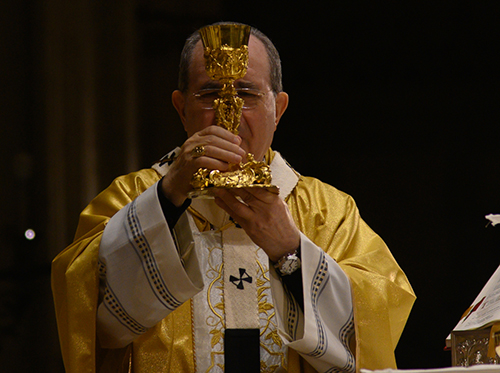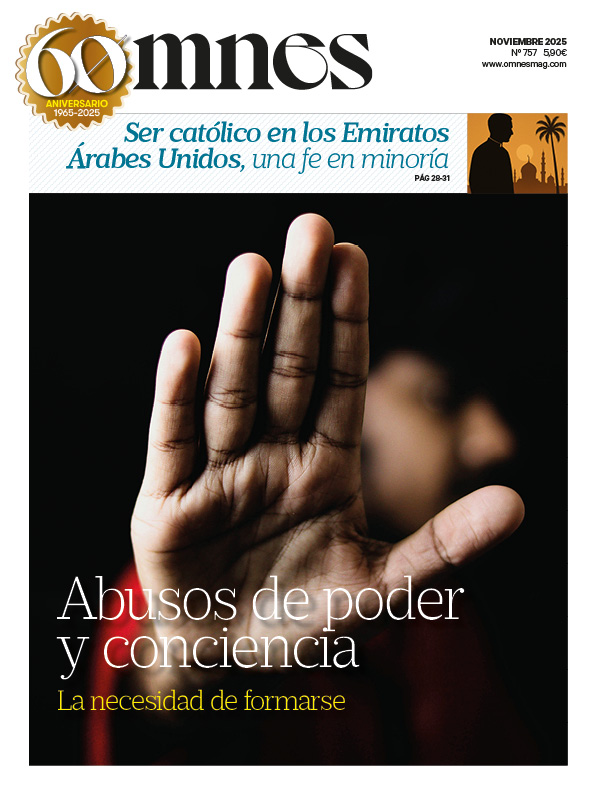How does the liturgy help to form the personality, authentic values, affectivity?
Together with prayer and spiritual combat (cf. Exhortation Gaudete et exsultate, chapter V, nn. 150-175), the liturgy is an important means for the formation of the Christian's personality. Today many are unaware of this. Education in the faith requires a good liturgical and catechetical-sacramental ("mystagogical") formation.
In a book by Dietrich von Hildebrand ("Liturgia y personalidad", ed. Fax, Madrid 1963), written in the thirties, this German philosopher provides arguments that are still current today. He stresses that the formation of the personality is not the primary purpose of the liturgy. The purpose of the liturgy is the glory and praise of God and, derivatively, that of imploring God's graces. At the same time, the liturgy, when well lived, has a pedagogical effect on people: it transforms our interior and opens us to the values (valuable contents) that are presented to us in the liturgy so that we can make them our own: the glorification of God the Father, the revelation of the face of Christ, the action of his Spirit on us, precisely to transform us into Christ.
The liturgy - he continues - teaches us to respond appropriately, also with our affections - wonder and gratitude, desire and joy, enthusiasm and love - to those objective values (it is not a matter of "likes") that are offered to us in the Mass and the other sacraments; values that have to do with God and his works (the creation of the world, the redemption and sanctification of man). It is not, therefore, a matter of subjectivist pleasures, but of a response to what is valuable in itself.
The difference between the egocentric man and the theocentric man depends on this capacity for response on our part, which the liturgy educates. The former, in its most radical version, is dominated by pride and concupiscence: he is blind, indifferent or hostile to values and above all to God. In other cases, the egocentric person - even if he possesses a certain spirituality - may help another person or even turn to God. But he does so for a "moral" purpose, to grow spiritually himself, and not out of love for others or for love of God.
The egocentric person, if he repents of a wrong committed or stops before the beauty of a moral value that he discovers in another person or before the greatness of God, will do so as if he were savoring his own (and not entirely true) "piety", in order to "deserve more" or to "become more perfect", instead of giving himself totally to that which is worthwhile in itself. And then, precisely because of this selfish reaction, he is deprived of an authentic transformation.
Therefore-and these are reflections that we can use today to form those who participate in the sacraments-a good liturgical education also teaches us to free ourselves from what Pope Francis calls worldliness or spiritual corruption (cf. Exhort. Evangelii Gaudium, nn. 93-97; Exhort. Gaudete et exsultate, nn. 164-165). This is so, because the most important thing in the liturgy is not what we do, but what God does.
Hildebrand explains that those who are formed in the spirit of the liturgy (in prayers, acclamations and chants, gestures and words) will be inclined to give an adequate response to everything precious: the beauty of created nature, the moral beauty of neighborly love..., as a radiance of God's glory. All this, as a joyful gratitude and a happy acceptance. Not as a painful demand of those who feel obliged to such a response. Not out of selfishness, but out of love. A love that is fulfilled in Eucharistic communion, for Christ has promised: "He who eats my flesh and drinks my blood abides in me and I in him" (Jn 6:56). It will not be egocentric but theocentric.
At the same time, the German philosopher warns of a mistaken vision of theocentrism, on the other extreme: to think that only that of God is of value, while "our own", the personal, "our" thanksgivings and acts of adoration or sacrifices (we could add: our works, the joys and sorrows of ordinary life) would have no value.
In the face of this, a good liturgical education - through a true spirit of prayer: giving thanks, asking forgiveness, uniting ourselves to the will of God - teaches us a whole hierarchy of values: it teaches us what the different realities (friendship, the beauty of creatures, etc.) are worth before God and for the love of God. It teaches us that, through the values of reality (of its authentic values), God calls us continually. It removes us from an attitude - frequent at least in his time, according to the author - of mere spectators or aesthetes who remain contemplating a "beautiful" or "interesting" thing, without feeling challenged by what the liturgy is really worth.
Looking at our situation today, we would have to recognize that, since the liturgy is so unknown and undervalued, many are deprived of this education in affectivity and in the values proper to a Christian. To this could be added the rediscovery, following the Vatican Council IIof the sanctifying value of ordinary realities, when they are lived in a Christian spirit.
Indeed, the Council declared that, especially in the case of the lay faithful, "all their works, their prayers and apostolic initiatives, their married and family life, their daily work, their rest of soul and body, if done in the Spirit, and even the very trials of life if patiently borne, become spiritual sacrifices, acceptable to God through Jesus Christ (cf. 1 Pet 2:5), which in the celebration of the Eucharist are piously offered to the Father together with the oblation of the Lord's body. In this way the laity, too, as worshippers who in every place act in a holy manner, consecrate the world itself to God" (Lumen Gentium, 34).
Returning to the reflections of our author on the need to respond adequately to objective values, among them those of the liturgy, Hildebrand is very clear: "Precisely in this internal adequacy with the objective hierarchy of values lies the mystery of true personality" (p. 90, emphasis added). As an example, he cites the Gospel character who sells all he has in order to obtain a single pearl of great value (cf. Mt 13:45-46). Not everything is worth the same. And this, he proposes, must then be translated into all levels of personal conduct: adoration of God, respect for others, the value of work well done, freedom and health, contact with nature and art, the meaning of material goods, the difference between pleasure and happiness, etc.
The philosopher argues that true personality is measured or defined by what we love, by the goods that attract us, by the ability to sacrifice what is worth less for what is worth more; ultimately, by the longing for God, which gives wings to our whole being and makes all values truly full. The liturgy - not only in the Mass but also, for example, in the "liturgical year," where some feasts give way to others that celebrate "what is most valuable," the central mysteries of the Christian faith - teaches us this hierarchy of values which, in the Christian perspective, objectively governs reality.
So much for Von Hildebrand's remarks.
Turning again to our own time, it is worth recalling how the now emeritus Pope Ratzinger has pointed out that in the liturgy, in addition to the mysteric aspect (the actualization of the Paschal Mystery of Christ's passion and resurrection), the existential aspect must be considered. That is, the fact that in receiving the Eucharist we cease to be separate individuals and become the Body of Christ - the Church: we are no longer many separate "I's", but united in the same "I" of Christ. This is why the liturgy is the heart of being Christian: because by opening ourselves to Christ we open ourselves to others and to the world, we break the original sin of selfishness and we can become truly just. The liturgy transforms us and with it begins the transformation of the world that God desires and of which he wants us to be instruments (cf. Meeting with the priests of the Diocese of Rome, 26-II-2009; Encyclical Deus Caritas Est, nn. Deus caritas est, nn. 12ff).
A few days ago, in a video message to an international congress of catechists, Francis reminded them that their task consists in "the communication of an experience and the witness of a faith that sets hearts on fire, because it stirs the desire to encounter Christ". And in the Christian life as a whole, education in the faith "finds its vital lymph in the liturgy and the sacraments". In the sacraments, whose center is the Eucharist, Christ becomes contemporary with the Church, and therefore with us:
"He makes himself close and near to all those who receive him in his Body and Blood, and makes them instruments of forgiveness, witnesses of charity to those who suffer, and active participants in creating solidarity among people and peoples". Thus "he acts and works our salvation, allowing us to experience from now on the beauty of the life of communion with the mystery of God the Father, Son and Holy Spirit" (Videomessage, 22-IX-2018). Thus we also see how the liturgy educates our values and our affections.
Degree in Medicine and Surgery from the University of Santiago de Compostela. Professor of Ecclesiology and Pastoral Theology in the Department of Systematic Theology at the University of Navarra.








